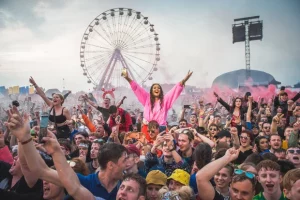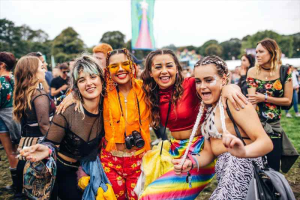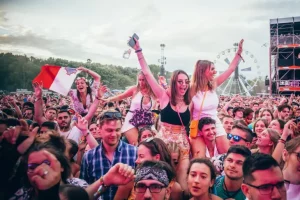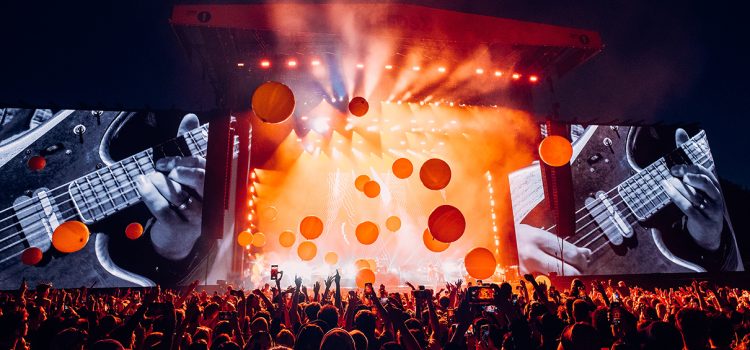
Introduction
The UK has long been a global hub for music festivals, hosting some of the most iconic events in the world, such as Glastonbury, Reading and Leeds, and Wireless. These festivals not only celebrate music but also offer a unique blend of culture, art, and social experiences. As we look toward the future, the landscape of UK music festivals is evolving. This article explores the trends, challenges, and innovations shaping the future of UK music festivals and what attendees can expect in the years to come.
The Growth of Hybrid Festivals: In-Person and Digital Experiences

Sustainability: A Growing Priority for UK Festivals

UK music festivals are focusing more on being eco-friendly as climate change becomes a bigger problem. Organizers are finding ways to cut waste and lower carbon emissions. Festivals like Glastonbury and Boomtown are leading the way by banning single-use plastics, encouraging carpooling, and using compostable food packaging.
In the future, festivals may adopt even more green ideas, such as:
- Using renewable energy to power stages
- Providing shuttle buses or bike-sharing for transport
- Selling eco-friendly merchandise and food
- Setting up better recycling and composting systems
These changes not only help the planet but also match the values of many festival-goers, especially younger people who care deeply about the environment.
The Role of UK Music Festivals
UK music festivals play a big role in shaping the music industry. They give artists a platform to showcase their talent to large audiences. Many emerging artists have used festivals as a stepping stone to launch their careers. Festivals also serve as a space for musical innovation, where new sounds and genres are often introduced to the public.
In addition, these events are important social gatherings. They bring people together from all walks of life to celebrate music, culture, and shared experiences. Festivals offer a space for socializing, creativity, and cultural exchange, which is a big part of their appeal.
Technological Innovations: Immersive and Interactive Experiences

Technology is changing music festivals, and it will keep growing in importance. UK festivals are using new tools to make the experience better for everyone.
Virtual reality (VR) and augmented reality (AR) are some of the coolest ideas. With VR, you could watch 3D hologram performances or enjoy light shows that move with the music. Some festivals, like Tomorrowland, already let fans join from home using VR.
Festivals are also using apps and social media more. Apps can help you plan your schedule, find your way with maps, and get real-time updates. Social media might even let fans vote on setlists or stream shows live. These tools make festivals more fun and interactive for everyone.
Music Festivals as a Cultural Celebration
UK music festivals are more than just about the music. They’re cultural celebrations that bring people from different backgrounds together. Every year, thousands of people travel from all over the world to experience the atmosphere and enjoy the music. Festivals often include art, food, and fashion, which makes them unique events. The creative energy at these festivals encourages self-expression and cultural exchange. Attendees don’t just enjoy great performances but also have the chance to try new foods, see different art forms, and experience different cultures.
Connecting People Through Shared Experiences
One of the greatest benefits of UK music festivals is the chance to connect with others. Whether you’re attending with friends or meeting new people, festivals offer an environment for socializing and building memories. Fans often bond over their love for the music and the excitement of the event. Many festival-goers form lasting friendships through these shared experiences. This sense of community is one of the main reasons people return to festivals year after year. It’s a place where people can escape from their daily routines and come together for a common purpose.
Diversity and Inclusivity: Broadening the Scope of Music and Culture

The future of UK music festivals will focus more on diversity and inclusivity. Festivals have always brought people together, but there’s still room to improve.
We can expect to see more festivals featuring music and cultures from underrepresented groups. Performers from marginalized communities will have more opportunities to shine. Organizers are also working to make festivals safer and more welcoming for everyone, no matter their gender, ethnicity, sexuality, or ability.
Inclusivity will go beyond performers. Festivals will improve access for disabled attendees, offer better bathroom facilities for all, and create programs that celebrate the diversity of the crowd. These changes aim to make festivals a place where everyone feels included.
The Impact of Festivals on Local Communities
Music festivals also have a significant impact on the local communities where they’re held. Many festivals are located in rural areas or smaller towns, which can benefit from the influx of visitors. The local economy gets a boost from ticket sales, food vendors, transportation, and even accommodations like hotels and guesthouses. Festivals also create temporary job opportunities in event management, security, and hospitality. Beyond the financial benefits, festivals bring attention to these areas, making them more known to tourists who may visit again in the future.
The Return of Smaller, Boutique Festivals

Big festivals like Glastonbury will always be popular, but smaller boutique festivals are becoming more common in the UK. These festivals offer a more personal experience with fewer crowds and focus on specific music styles or unique themes.
Boutique festivals prioritize quality over size. They carefully choose performers to match certain tastes rather than trying to please everyone. Many also include activities like wellness sessions, art displays, or workshops about sustainable living. This makes them great for people looking for a more unique and meaningful festival experience.
Smaller festivals often feel more like close-knit communities. They give people a chance to connect and support new artists. As more people look for personal and memorable events, this trend is likely to grow.
The Importance of Accessibility at Festivals
As music festivals continue to grow in popularity, ensuring accessibility is becoming more important. Festival organizers are increasingly focusing on making events welcoming for everyone, including people with disabilities. This includes providing accessible paths, special viewing areas, and facilities for those with mobility issues. Festivals are also becoming more inclusive by offering services for those with hearing impairments, such as sign language interpreters or captioning for performances. The goal is to make sure that everyone, regardless of ability, can enjoy the festival experience.
The Role of Social Media and Influencers

Social media is shaping the future of UK music festivals. Platforms like Instagram, TikTok, and Twitter are not just for promotion anymore. They let fans connect with artists and share their festival moments with everyone.
Influencers are becoming a big part of festivals. Organizers work with them to sell tickets and get more people excited. Influencers may even help decide things like which artists perform, how stages look, or what new tech is used.
As social media grows, it will continue to change how festivals are planned and enjoyed.
Music Festivals as a Cultural Celebration
UK music festivals are about more than just music. They are cultural events that bring people from all backgrounds together. Every year, thousands of people travel to enjoy the special atmosphere and great music.
Festivals often include art, food, and fashion, making them unique experiences. They are full of creative energy that inspires self-expression and sharing of cultures. Visitors can enjoy amazing performances, try new foods, see different art, and learn about other cultures. These festivals are a mix of fun and discovery.
Connecting People Through Shared Experiences

Challenges Faced by UK Music Festivals
UK music festivals are fun, but they have challenges. One big issue is the weather. British weather can be unpredictable, with rain and mud sometimes making festivals harder to enjoy. Another problem is waste. Festivals create a lot of trash, like plastic bottles and food packaging. Organizers are trying to be more eco-friendly, but it’s still a challenge. The cost is also a barrier. Tickets and travel can be expensive, making it hard for some people to attend. Finally, stricter security due to global events can make festivals feel less welcoming for some.
The Future of UK Music Festivals

The future of UK music festivals looks bright with many exciting developments ahead. Technology will play a bigger role, with virtual reality and live streaming making festivals more accessible to people around the world. Sustainability efforts will continue to grow, with organizers focusing on reducing waste and using renewable energy sources.
Smaller, more intimate festivals are also on the rise, offering unique experiences that larger festivals can’t match. Inclusivity and diversity will be central to future festivals, ensuring that they are welcoming spaces for everyone. Overall, the future of UK music festivals will be shaped by innovation, sustainability, and a focus on creating the best possible experience for attendees.
Comparative Analysis: UK Music Festivals – Current vs Future Trends
| Aspect | Current Trends | Future Trends |
|---|---|---|
| Festival Size | Large-scale events (Glastonbury, Reading, etc.) | Rise of smaller, boutique festivals with niche audiences |
| Technology | Basic festival apps and digital schedules | Virtual reality (VR), augmented reality (AR), 3D holograms |
| Sustainability | Some eco-friendly initiatives like plastic bans | More emphasis on renewable energy, waste management, and green transport |
| Diversity and Inclusion | Focus on mainstream genres and artists | Greater representation of diverse musical genres and cultures |
| Social Media Influence | Use for marketing and engagement | Integration of influencers, fan voting, live-streaming performances |
| Accessibility | Limited access for disabled attendees | Improved accessibility, with better facilities for disabled individuals |
Conclusion: A Bright Future for UK Music Festivals
The future of UK music festivals is bright and filled with exciting possibilities. From hybrid events combining in-person and digital experiences to a greater focus on sustainability and inclusivity, the landscape of music festivals is evolving to meet the demands of a new generation of festivalgoers. With the integration of new technologies and the rise of smaller, more intimate festivals, UK music festivals will continue to be a major part of the cultural fabric in the years to come.
As we look ahead, the future of UK music festivals will not only celebrate music but also offer attendees more diverse, engaging, and eco-conscious experiences. It’s clear that festivals are adapting to the changing world, ensuring that they remain a vital part of both the music industry and the cultural zeitgeist for years to come.










